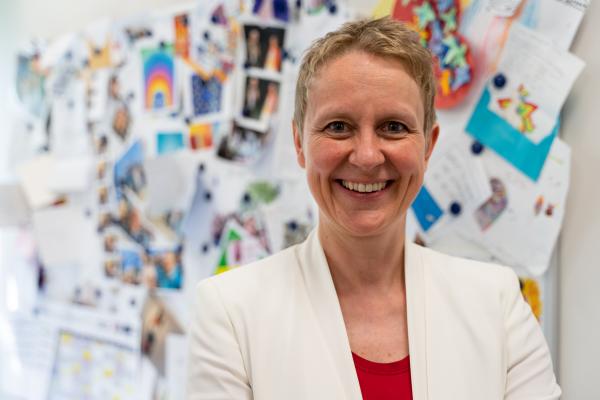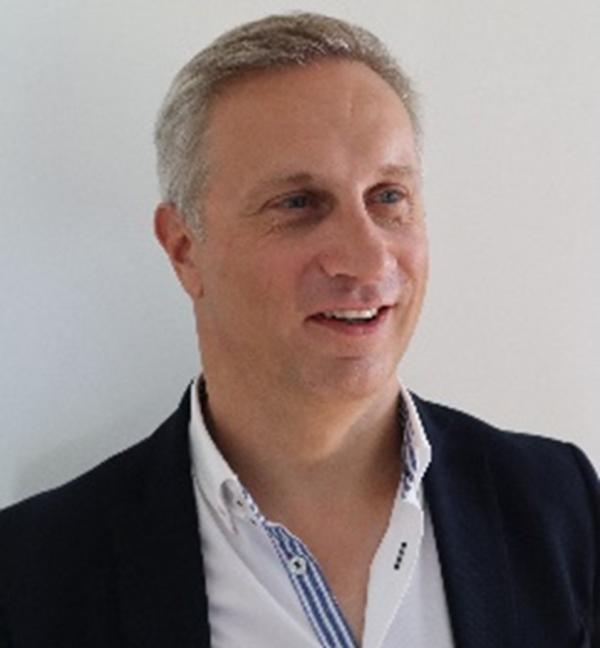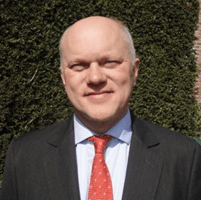GUBERNA Directors Sparkle - Hadewig De Corte
Bij hospitalen zitten er ook artsen in de ‘governance tripod’
Hospital governance vergt vandaag een bijzondere aanpak en specifieke kennis qua deugdelijk bestuur. Met de medische raad krijg je immers te maken met een bijkomende ‘macht’ aan de bestuurstafel. Je gaat om met boeiende concepten als “Co-Governance” en “Co-Gestion”. GUBERNA alumna Hadewig De Corte die van 2018 tot begin 2022 als CEO een hospitaal leidde, blikt voor ons terug op de strategische ideeënuitwisselingen en haar beleidsvoering, ook tijdens de pandemie.
Eerst het interview bekijken en dan verder lezen?
In de Brusselse Kliniek Sint-Jan (de opvolger van de Gasthuiszusters Augustinessen die bogen op 800 jaar geschiedenis) geven 2000 medewerkers en 300 hoogopgeleide artsen elke dag het beste van zichzelf, ondermeer voor de meer dan 500 patiënten die er elke dag verblijven. Als economiste, heeft Hadewig De Corte zich er vier jaar kunnen engageren als CEO, voordien 15 jaar werkzaam bij BNP Paribas Fortis en 5 jaar bij Wolters Kluwer. Deze moeder van een nieuw samengesteld gezin met 3+2 kinderen is tevens GUBERNA Certified Director.
In elke eerdere professionele opdracht werd zij steeds gedreven door de zin om een positieve impact te helpen realiseren voor een betere wereld. En in de ziekenhuissector, maatschappelijk relevante sector bij uitstek, kon ze dat ook met hart en ziel waar maken…

Hadewig De Corte
Vice President of the Royal Theatre of La Monnaie, Director of the Belgian Association of Hospital Managers and of various non-profit organisations. Was CEO of the Clinic Saint-Jean in Brussels until March 2022. Teaches Business Organisation at Odisee.
- Passionate about caring for people and planet;
- Sensitive to corporate governance and leadership;
- Extensive management experience in banking, information & technology and healthcare;
- Extensive experience of leading transformations and change;
- In-depth understanding of organisations, processes & systems that have people at their heart;
- Core values: professionalism - inclusion - diversity
LinkedIn
Tel: +32 (0) 477 400 423
Email: hadewig@frenay-decorte.be
Welke belangrijke uitdagingen kruisten er uw pad als CEO?
“Een kliniek is echt een complexe organisatie, zowel de inhoud als de processen als de governance als het regelgevend kader. En alle processen zijn er van ‘levensbelang’. Je voelt dat je daar een eindverantwoordelijkheid draagt voor de mens.
Een ziekenhuisorganisatie is een complex samenspel van vele verschillende mensen en stakeholders en de financiering is er dringend aan vernieuwing toe. Het feit dat heel ons kwalitatief gezondheidssysteem hierdoor echt onder druk staat, kleurde meteen ook mijn belangrijkste uitdagingen bij de kliniek Sint-Jan.
Vandaag gebeurt de financiering vooral op basis van medische handelingen en niet op basis van outcome. Daarenboven ligt quasi alles (hoeveel mensen, doen wat, voor wie en op welk moment) strikt vast in de regelgeving. Om duurzaam te zijn en kwaliteit te kunnen blijven bieden moet je de beschikbare middelen beter (her)verdelen en flexibel kunnen schakelen indien nieuwe events zich voordoen. Denken we maar aan Covid. Enkel met de juiste ‘incentives’ kan je ervoor zorgen dat je synergiën realiseert, nieuwe technologieën nog beter inzet en loskomt van te veel starre regels die de nodige flexibiliteit in de weg staan.
Mijn opleiding bij Guberna heeft me bijkomende tools en methodes inzake bedrijven gegeven zodat ik positief kan bijdragen aan de verdere professionalisering van de ziekenhuissector. Een sector waar ik gedurende de laatste jaren de job van mijn leven heb kunnen doen.
Hoe blikt u als CEO terug op uw samenwerking met uw bestuursorgaan?
Het Bestuursorgaan, ja dat is de nieuwe naam voor “Raad van Bestuur”, is bij uitstek de plaats om vooruit te kunnen gaan. Voor mij zijn dit de belangrijkste taken:
- De bewaker zijn van een zo duidelijk mogelijke missie;
- Bepalen van de strategie op voorstel van het management;
- Het juiste leiderschap aanstellen;
- Monitoren van de uitvoering van die strategie, via controles de nodige en adequate ‘checks & balances’ uitvoeren;
- De CEO en het executive team ondersteunen, vooral op de sleutelmomenten.
Zo heb ik meegemaakt dat de Covid-19 pandemie leidde tot een sanitaire crisis, maar ons ook een momentum gaf met een extra hefboom. Dankzij de voordien uitgestippelde strategie konden we door de storm heen kijken en wisten we waar we na de pandemie naar toe moesten. Zodra het ergste voorbij was, zijn we, parallel met de crisis, doorgegaan met onze strategische projecten, zoals de verbouwing van de polikliniek of een nieuwe ICT infrastructuur. De crisis heeft niet alleen onze strategie bevestigd maar daaruit is ook gebleken dat een goed strategisch plan hebben een sterke houvast was in moeilijke omstandigheden.
Hoe verliep de samenwerking met de Medische Raad?
De Medische Raad beschikt over een aantal, bij wet vastgelegde, bindende bevoegdheden over aangelegenheden waar het Bestuursorgaan dus zelf niet unilateraal mag of kan over beslissen (aanwerving artsen, bijdragen van de artsen aan het ziekenhuis, financiën meer in het algemeen). Dit is een mooi voorbeeld van wat wij ‘co-governance’ noemen op het niveau van het Bestuursorgaan. Je moet dan telkens een evenwicht vinden tussen het Bestuursorgaan en de Medische Raad. Dat betekent eigenlijk ook dat de wetgever een extra orgaan heeft toegevoegd aan de klassieke ‘Governance driehoek van Algemene vergadering, Bestuursorgaan en Directiecomité…
Binnen de gezondheidszorg zijn de artsen, die vaak een zelfstandig statuut hebben, een heel belangrijke doelgroep en is er dus naast de Medische Raad nog een ruimere samenwerking nodig tussen de artsen en het management. Dat is wat ik “Co-Gestion” of “Co-Management” zou noemen. Artsen moeten ook op de verschillende niveaus van de instelling betrokken worden in het dagelijks bestuur van het ziekenhuis (functioneren van een nieuwe polikliniek, een nieuwe informatica systeem, proces optimalisatie in het operatiekwartier). Dat vergt goede spelregels zodat het duidelijk is wie welke rol te vervullen heeft. Dit kan ook wel wat spanningsvelden met zich meebrengen…
Laat ons afronden met uw andere bestuursmandaten
Ook als bestuurder poog ik steeds het beste uit de mensen te halen. Vanuit de organisatiewaarden poog ik de juiste accenten te helpen leggen. Voor een bestuurder is het interessant om multidisciplinair en systemisch te kunnen werken zodat iedereen kan excelleren. Als vice voorzitter bij de Koninklijke Muntschouwburg stel ik vooral mijn ervaring in finance, operaties en transformaties ter beschikking, terwijl andere bestuurders met hun andere expertises het bestuurlijk pallet vervolledigen. Als bestuurder zit je niet in een operationele rol, maar ben je wel bevragend en adviserend bezig. Je behandelt elk voorstel vanuit een open geest met de nodige kritische zin. Mijn academisch onderbouwde opleidingen bij GUBERNA en Vlerick hebben me een aantal technieken aangereikt om daar goed te kunnen functioneren. Ook vind ik het belangrijk dat we elkaar in het bestuurlijk collegiaal orgaan scherp houden ten goede van de organisatie.
En zo ben je ook bij de GUBERNA Alumni terecht gekomen!
Inderdaad. De GUBERNA Alumniwerking is voor mij een goed netwerk om voortdurend reflectie, ervaringen en inzichten te kunnen uitwisselen.
Bekijk de hoogtepunten van het interview

Interview door Francis Coulonval
GUBERNA Director
Co-CEO at Solvers.ai (intelligent automation of your administration)
Tel: +32 (0) 478 88 59 12
Email: francis.coulonval@solvers.ai

Met de ondersteuning van Chris Wouters
GUBERNA Certified Director
Business Partner and Advisor, President Board of Onderwijs van Zusters van Christelijke Scholen van Vorselaar - koepel, Board member Media holding, Board member Lieven Gevaertfonds, Board member Logia
Tel: +32 (0)477 66 60 83
Email: wouters_chris@skynet.be
Want to contribute to GUBERNA Directors Sparkle?
GUBERNA wants to be a true community in which each member can perform his/her role as director in the best conditions. To encourage the exchange of experiences and knowledge, the GUBERNA Directors have launched an interview series: GUBERNA Directors Sparkle. Through the stories of experienced directors, we want to inspire our members.
We would like to invite the GUBERNA Directors and GUBERNA Certified Directors to provide topics and people to be interviewed. In 2022 we want to focus on the following topics:
- How can the board of directors contribute to a better climate?
- From fact-checking to process-driven risk management overseen by the board of directors?
- The role of the board chair in digital transformation.
- How to strengthen your company to grow through acquisitions and partnerships and get your corporate governance right.
- The young generation of board members.
Would you like to contribute to GUBERNA Directors Sparkle or do you have suggestions for interviewees or topics? Please send an email to Danny VandeVyver.
